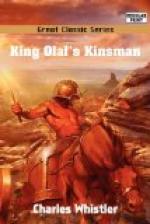“What of Guthrum’s days?”
“Danish laws in the Danish Anglia,” she said, “and the peace that comes after the sword and the torch.”
“Fire and sword we have had,” I said. “Danish laws have ever been ours. But Ethelred shall be king.”
“Ethelred is king,” she answered; “but I speak of time to come.”
Then Wulfnoth broke in:
“What is this that you speak of, dame? Tell me if I shall bear fire and sword into Ethelred’s land, and give it the peace that shall be thereafter.”
Then she turned her look away from us, and stared across the fire and out of the doorway.
“Not with you, nor with your son, but with your son’s son shall fire and sword come into this land of ours,” she said.
“Godwine’s son!”
“Aye—Harold Godwinesson, who is unborn. Look through the smoke, lords, across the valley, and see if you can learn aught.”
Then I stared out through the blue reek, and the earl looked.
“You do but play with me—I see nought!” he cried, half starting up in anger.
But I minded him not.
Many a fight have I seen—but that which I saw from Caldbec Hill through the smoke of the fire is more than I may say. No fight that I have seen was as that—it was most terrible. Surely, if ever such a fight shall in truth rage across the quiet Senlac stream and up the green hillside, the fate of more than a king shall hang thereon. Surely I saw such a strife as makes or ends a nation.
The old woman laughed.
“What has Redwald seen?” she asked mockingly.
The earl glanced at me, and so plainly was it written in my face that I had seen somewhat awesome, that he gazed at me in amaze.
And I rose up and said:
“Let me go hence—I will see no more.”
And I was staggering to the doorway; but Wulfnoth grasped my arm and stayed me, saying:
“Bide here and say what you have seen—if it is aught.”
“Ask me not, earl,” I answered.
Then the dame spoke in her slow, soft voice.
“What banner saw you? Say that much, Redwald.”
“The banner that flies from Pevensea walls—the banner that bears a fighting warrior for its sign.”
“Ha!” said Wulfnoth; “was it well or ill with that banner?”
“I know not how it went; I saw but a battle—yonder,” and I pointed to where, across the haze of smoke, valley and stream and hill stretched before me, and thought that surely the fight still raged as I had seen it—wave after wave of mail-clad horsemen charging uphill to where, ringed in by English warriors, Saxon and Anglian and Danish shoulder to shoulder, the banner of the Sussex earls stood—while from the air above it rained the long arrows thick as driving hail.
One thing I knew well, and that was that the warriors who charged wore the war gear of the dukes of Rouen—the Normans. How should they come here? and who should weld our English races into one thus to withstand so new a foe from across the sea?




